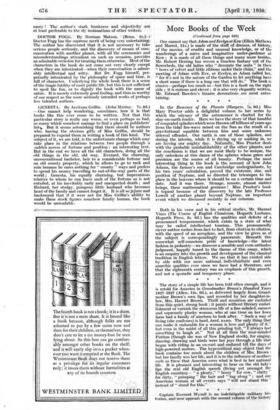The story of a simple life has been told often
enough, and it is retold for America in Grandmother Brown's Hundred Years 1827-1927 (Allen, 12s. (h.), as delivered largely from Grand- mother Brown's own lips, and recorded by her daughter-in- law, Mrs. Harriet Brown. Thrill and sensation are excluded from this quiet, strong book'; it paints without literary embel- lishment or varnish the strenuous life of a fine-minded, earnest and supremely plucky woman, who at one time on her Iowa farm had a family of nineteen to look after. "Such a way of living (she confesses) is hard, hard, HARD. The only thing that can make it endurable for a woman is love and plenty of it," but even in the midst of all this grinding toil, "1 always had something to laugh at." Not at all then- 'the sour-minded Puritan (though she was of New England stock), for singing, dancing, drawing and birds were her joys through a life that began with riding in an-ox-cart and: endured till the days of high-poweired motors. The hypercritical- May Object that the book contains too much about the children of Mrs. Brown ; but her family was her life, and it is to the influence of mothers such as these that America owes what is best in her national life. It is pleasant and interesting to hear on the old lady's lips the real old English speech (living yet amongst the
English counties)— a plenty,' " bossy " for cow, chitty " for dirty, " primping " the hair and "tag along " ; and one American woman at all events says "will not stand this instead of " stand for this."
* * * a










































 Previous page
Previous page